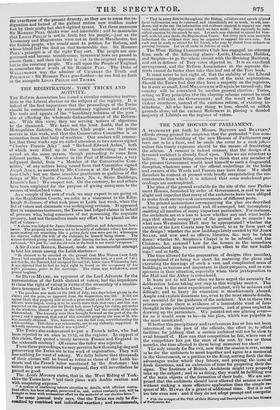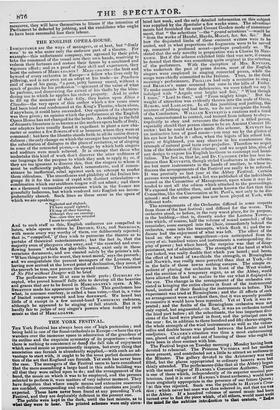THE NEW HOUSES OF PARLIAMENT.
A STATEMENT put forth by Messrs. BRITTON and BRAYLEY,* affords strong ground for suspicion that the pretended " free com-
petition" for the building of the new Houses of Parliament may
turn out to be a farce, and be made the cover to a rank job,— unless this timely exposure should be the means of frustrating-
the scheme. A rumour is indeed current, that the design of a favoured architect is already fixed upon. This we are reluctant to believe. We cannot bring ourselves to think that any member of the present Government would lend himself to such a disgraceful deception, whatever some of the official underlings in the holes and corners of the Woods and Forests may have done We shall therefore be content at present with briefly recapitulating the cir- cumstances from which it is inferred that some undeihand prc- ceedings are contemplated. The plan of the ground available for the site of the new Parlia- ment Houses, furnished by order of Government, is said to be so slight and imperfect that many of the architects have been obliged to make fresh surveys and measurements of different parts. The printed instructions accompanying the plan are described as being not only undigested and ill-arranged, but incomplete; omitting all mention of many important particulars. For instance, the architects are at a loss to know whether any and what build- ings that already occupy part of the ground are to remain ? to what uses Westminster Hall may be appropriated? whether the exterior of the Law Courts may be altered, so as to form part of the design ? whether the new buildings lately erected by Sir Joss;
SOANE, and now used as offices, libraries, &c. may be taken down? whether St. Stephen's Chapel is to be rebuilt, and the Cloisters, &c. restored? how far the houses in the immediate neighbourhood may be removed to give effect to the new build- ings? and so forth.
The time allowed for the preparation of designs (five months), is complained of as being too short for maturing the plans and executing the drawings of such a vast and complicated mass of buildings, so various and important in their purposes, and so con- spicuous in their situation, especially when their juxtaposition to the Hall and the Abbey is considered. It boots not to tell how often we have urged the necessity for deliberation before taking any step in this weighty matter. The task, even to the most experienced architect, will be arduous and difficult; and to hurry its execution is mischievously absurd. Ample and explicit directions too, even to the most minute details, are essential for the guidance of the architect. Yet in these two primary points there is evidence of a lamentable want of fore- thought in the preliminary arrangements, and of gross neglect in drawing up the particulars. We pointed out one glaring error— for so it would seem to be—in the plan, which was palpable to the most uninitiated.
Whether this precipitancy and carelessness has or has not been intentional on the part of the officials, the effect is, to afford facilities for jobbing that a certain architect will not be slow to avail himself of. How can that competition be fair, where one of the competitors has got the start of the rest, by two or three months, the time allowed to them being moreover too short? The only remedy for the evil, now that the session is over, seems to be for the architects to meet together and agree to a memorial to the Government, or a petition to the King, setting forth the dis- advantages under which they labour, and praying the issue of fresh directions, and an extension of time for preparing their de-
signs. The Institute of British Architects might very properly take up the subject ; and in so doing, they would be fulfilling one of the main objects of the formation of their body. We are sur- prised that the architects should have allowed the session to close without making a more effective application than the simple re- quest of Mr. HAWES for a grant of additional time. But it is not too late even now : and if they do not adopt prompt and energetic • Vide the wrapper of No. VIII. of their History and Description of the late Haslet of Parliament, Sm.



























 Previous page
Previous page